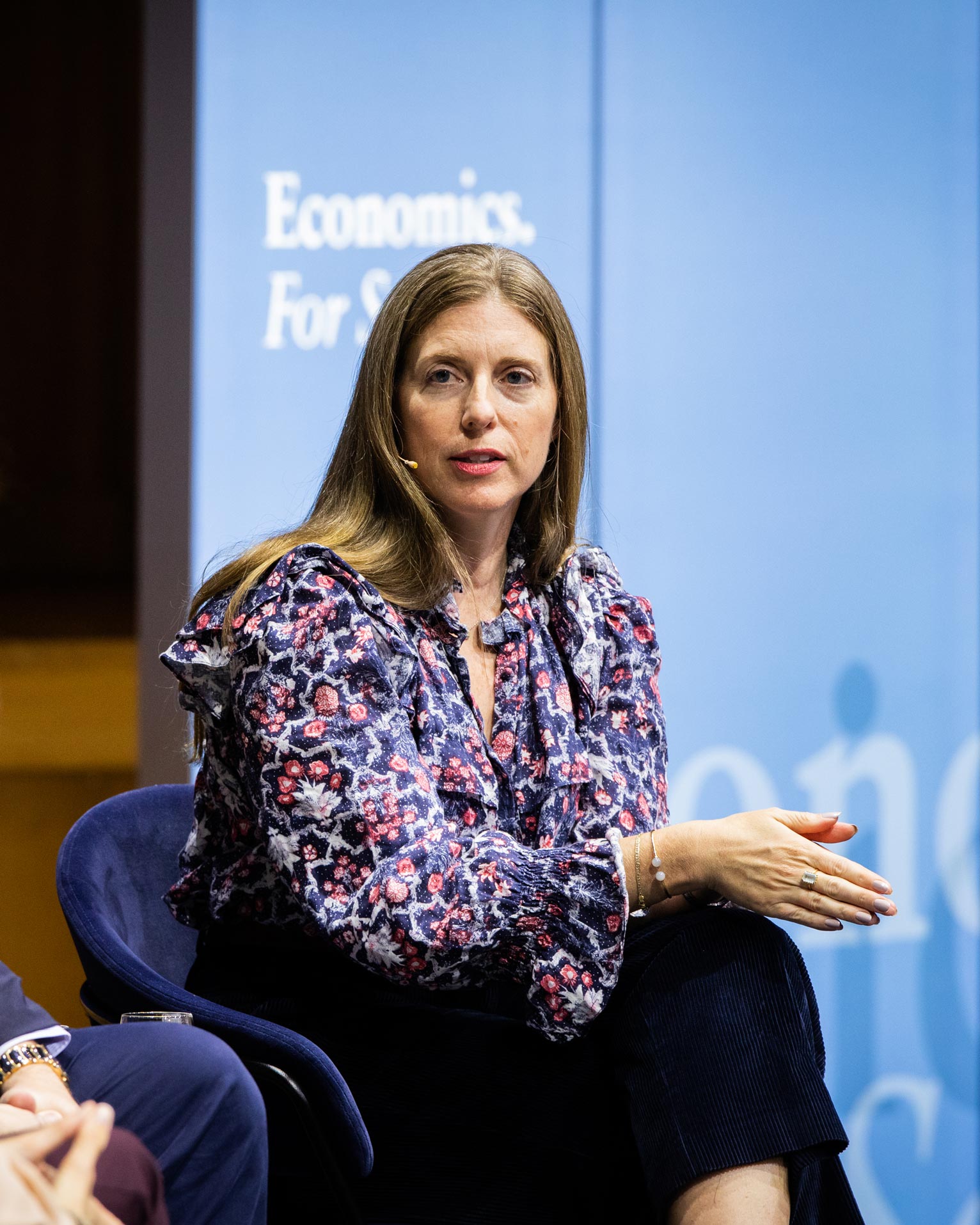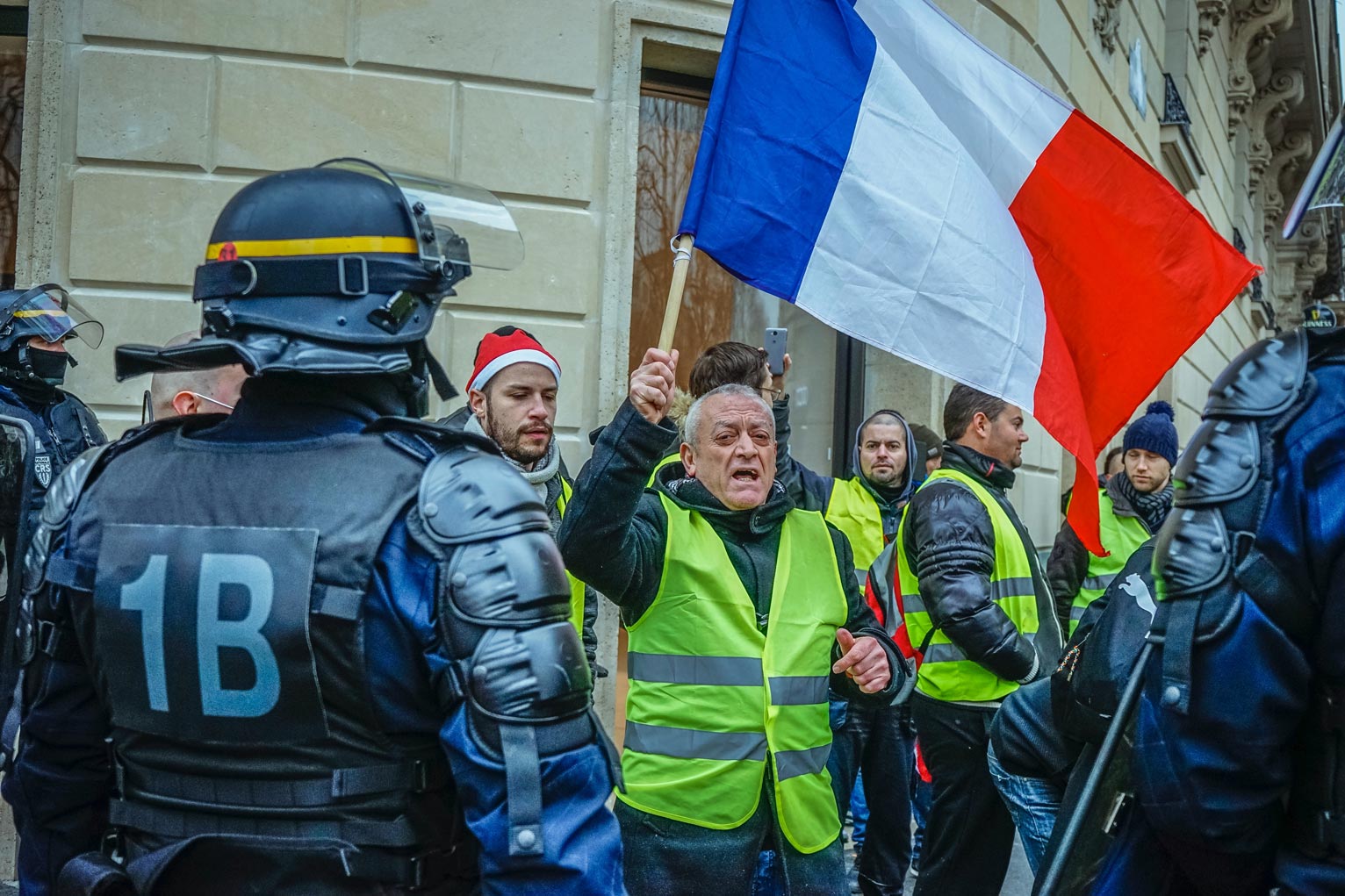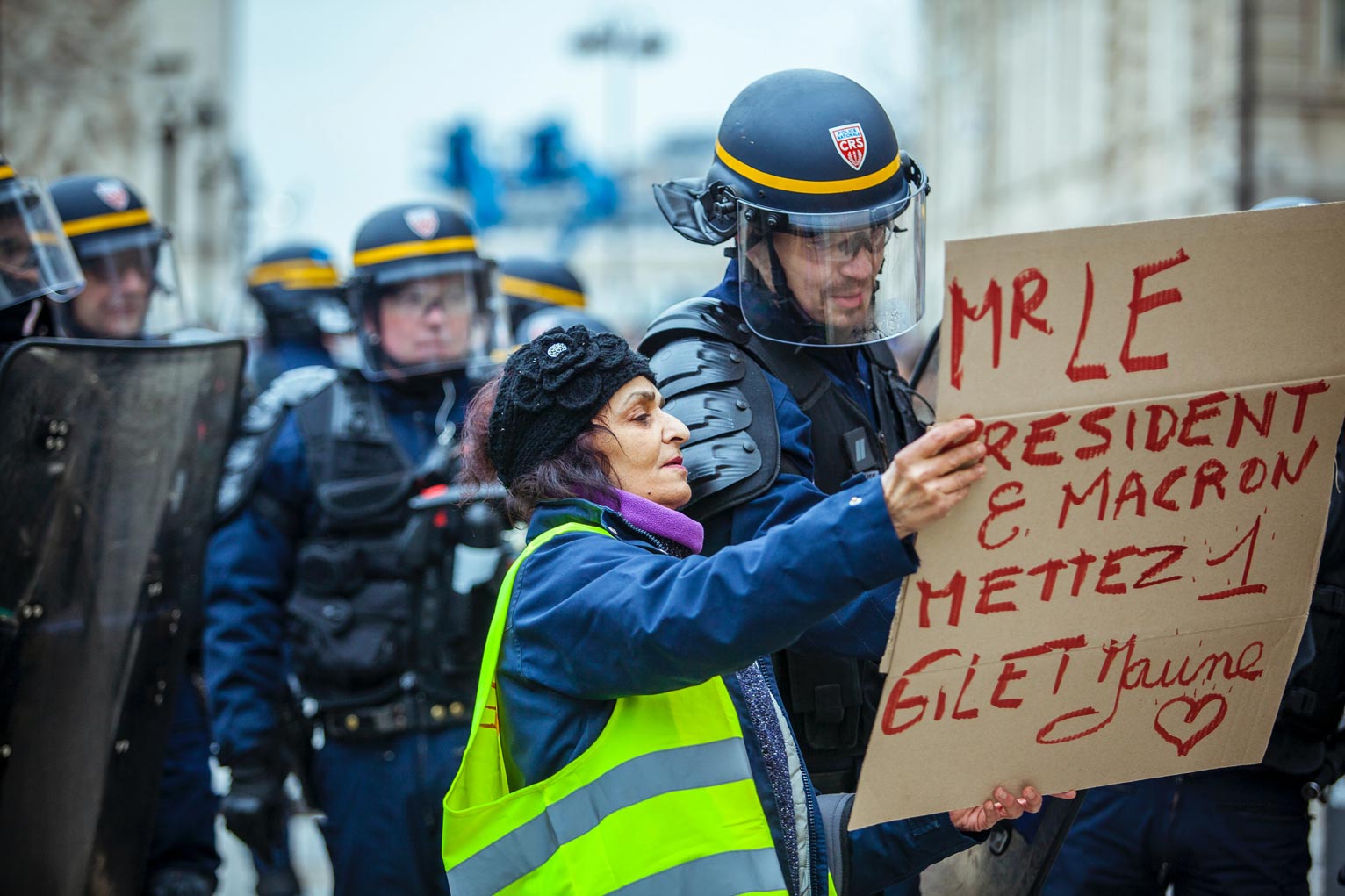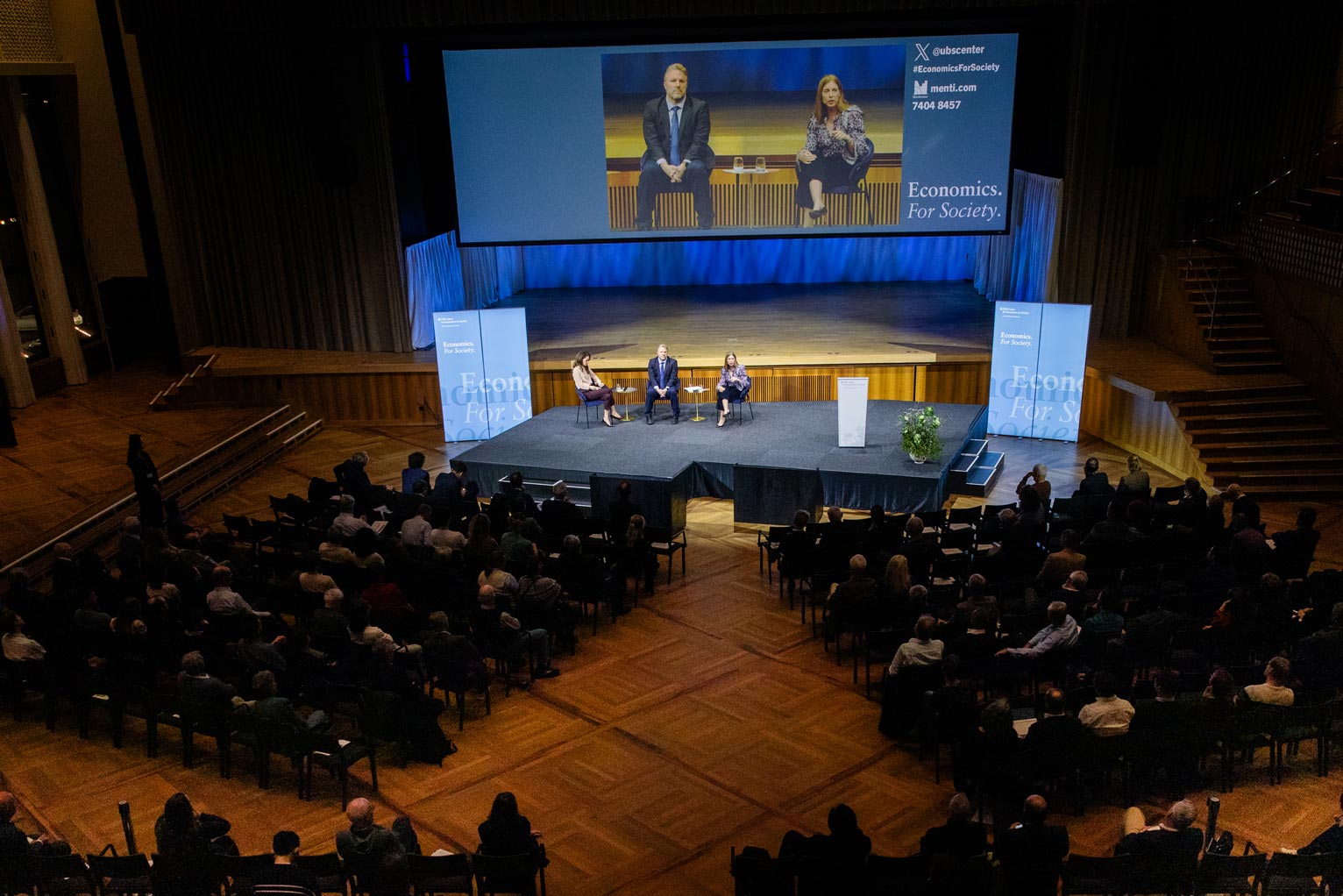Jump directly to
French democracy in crisis
In the limelight of the French president’s state visit to Switzerland, political scientist Hélène Landemore sees French democracy in crisis. Without a reform of the constitution, a revolution could soon take place.
This interview by Corina Gall was originally published in German in NZZ on 14.11.2023. Translated and edited for layout purposes by the UBS Center.
In the winter of 2018, the Yellow Vests movement marched for months against higher gasoline prices. In the spring, thousands shouted in the streets against pension reform. Protests are a tradition in France. But they are getting longer, louder, more violent.
Hélène Landemore grew up in France. She now conducts research on various forms of democracy at Yale University in the US. She believes that the French system has a central problem: the president is too powerful.
Mrs. Landemore, you spent the first 25 years of your life in France. Did you participate in protests?
Sure, already at school. In France, that’s part of education. I remember once skipping school to go to a demonstration. That was in 1993. I was seventeen years old.
What were you protesting for or against?
Against educational reform. I probably didn’t know exactly what it was about. In France, you learn early on that this is a normal way of engaging in politics. It’s not always questioned what it’s about.
You studied at elite French universities. Those who later work in the ministries or become president study there. What or who are these students protesting against?
The political mood at the École normale supérieure was left-wing. Unemployed people occupied the site at the end of the 1990s. They criticized the fact that they did not have a real chance in the French system. The majority of the students supported the cause and opened the door to them. This caused some problems.
What happened?
The people lived in the compound for a month. Then the government sent an armed police unit to clear it. I was in the wrong place at the wrong time. I was arrested and spent several hours in jail.
France is known in Europe as a country of many protests. Why?
In France, the state is traditionally seen as the enemy of the people. The country retained monarchical traits even after the revolution. The presidency, for example, is endowed with a lot of power. The French have a strong president and few opportunities for promoting their will, so they take to the streets against the government. France is a democracy, but its political culture is immature.
President Emmanuel Macron once said that the French wanted a strong president.
That is true. France became a democracy through violent revolutions and uprisings. A political culture developed where the president is a kind of savior or hero. This was especially true of former President Charles de Gaulle. The 1958 constitution was designed for figures like him.
As a general in World War II, De Gaulle led the resistance against the German occupation. What does this mean for today’s French presidents?
The expectation is immense. François Hollande wanted to be a “normal” president, so the French saw him as weak. They called him “Flanby President” – a reference to a soft caramel cream that lacks consistency. Macron therefore presents himself as a decisive and omniscient statesman. He fits the profile.
Protesting is a form of political participation. Surely the fact that there are so many demonstrations is also a sign that democracy is alive.
The protests show that the French are not apathetic and disinterested. But they are frustrated. And the streets are the only outlet. Instead of voting, people are protesting more often, with increasing violence.
What needs to change?
France needs a constitutional change so that citizens can have more say and take more responsibility, for example, through citizens’ initiatives and referendums. That is the only way to change the political culture.
France already has the option of holding referendums. There have been only nine since 1958, when today’s Constitution was adopted. Why?
Only the president initiates a referendum. It is also optional and limited to certain subjects. It is not a democratic instrument in this form.
There is also the so-called shared initiative. A proposal is put to the vote if it is supported by a fifth of parliamentarians and five million French people.
That has never worked. The hurdle is too high, and the parliament proposes things that nobody cares about. The political system suffers from a lack of mutual trust.
Emmanuel Macron plans to lower the barriers to the shared initiative and extend referendums to more issues. But he hesitates on immigration and euthanasia because these issues would be emotionally debated. What do you think?
Macron’s stance is one of mistrust and condescension. He believes that people are too immature to decide on issues like immigration. This was the case in the major national debates that Macron launched in 2019 after the Yellow Vest protests. He identified four issues on which citizens could make suggestions. Immigration was not one of them. But controversial issues require open debate.
What you are calling for goes even further. You take the position that citizens should be part of the legislature by drawing lots.
In the current electoral system, we put people at the top who want power and attention, and that leads to an over-representation of the wrong people. That would be different if we were to select in a different manner. We would also have shy people, single parents, minorities -- people who don’t have the resources to campaign. And I’m sure that this would result in the better solutions for society.
France has tested this. We’ve had two citizens’ assemblies since 2019. People were reandomly selected to come up with proposals over several months, first on climate, then on euthanasia. You were involved in the second round as an expert. Did it work?
People were pessimistic at first. But that changed over time. In the first round on climate, a few of the 150 people dropped out. That’s why we started with 185 people in euthanasia. Only one person left because their new job was incompatible with participation.
Did Macron respond to the proposals?
The result is disappointing. The government says it has implemented 70 percent of the climate proposals. I guess it was a third. And one poll showed that the majority of French people support 13 of the 14 proposals. On the issue of euthanasia, we’re still waiting for a response from Macron.
The assemblies have not yet continued. Was this an attempt by Macron to calm the masses after the Yellow Vest protests?
That is quite possible. The violent Yellow Vest protests intimidated Macron. With the debates, he showed a willingness to compromise while distracting from the heart of the issues. I still hope that we can institutionalize the meetings. Polls show that a majority of French people support them.
Macron continues to underscore his authority by steadfastly pushing through controversial plans. Is there a risk that he will become autocratic?
Macron crossed this line on pension reform. Given the age pyramid, raising the retirement age is justifiable. The problem is that, despite the unusually loud criticism, he bypassed parliament and the public.
Or because of that. Because, as you said, the presidency is designed for authoritarian rule.
Yes, exactly. Macron is only partly to blame. The constitutional change is also needed to reduce the pressure on the president.
Law professor Dominique Rousseau said in Le Monde that a revolution would become inevitable without a revision of the constitution.
I totally agree. He is right.
What could a revolution in France look like in 2023?
Like the Yellow Vest Movements, only more violent.
In the limelight of the French president’s state visit to Switzerland, political scientist Hélène Landemore sees French democracy in crisis. Without a reform of the constitution, a revolution could soon take place.
This interview by Corina Gall was originally published in German in NZZ on 14.11.2023. Translated and edited for layout purposes by the UBS Center.
In the winter of 2018, the Yellow Vests movement marched for months against higher gasoline prices. In the spring, thousands shouted in the streets against pension reform. Protests are a tradition in France. But they are getting longer, louder, more violent.



Democracies under threat
Hélène Landemore’s appearance was part of a three-part series of events organized by the UBS Center for Economics in Society under the theme Democracies under threat. The series was kicked-off with Wolfgang Schäuble's lecture on 24 October at Universität Zürich. He is a German CDU politician, former Finance Minister, and the longest-serving member of the German Bundestag. Steven Pinker’s lecture followed at Universität Zürich on 7 November. The psychologist and bestselling author talked about rationality and its significance for liberal democracy. The highlight of the series was the annual Forum for Economic Dialogue on 13 November at the Kongresshaus Zürich, where the topic 'Democracies under threat' was examined and discussed with Nobel Prize laureate Herta Müller, democracy experts Hélène Landemore and Daniel Ziblatt, and many other speakers.
Hélène Landemore’s appearance was part of a three-part series of events organized by the UBS Center for Economics in Society under the theme Democracies under threat. The series was kicked-off with Wolfgang Schäuble's lecture on 24 October at Universität Zürich. He is a German CDU politician, former Finance Minister, and the longest-serving member of the German Bundestag. Steven Pinker’s lecture followed at Universität Zürich on 7 November. The psychologist and bestselling author talked about rationality and its significance for liberal democracy. The highlight of the series was the annual Forum for Economic Dialogue on 13 November at the Kongresshaus Zürich, where the topic 'Democracies under threat' was examined and discussed with Nobel Prize laureate Herta Müller, democracy experts Hélène Landemore and Daniel Ziblatt, and many other speakers.
